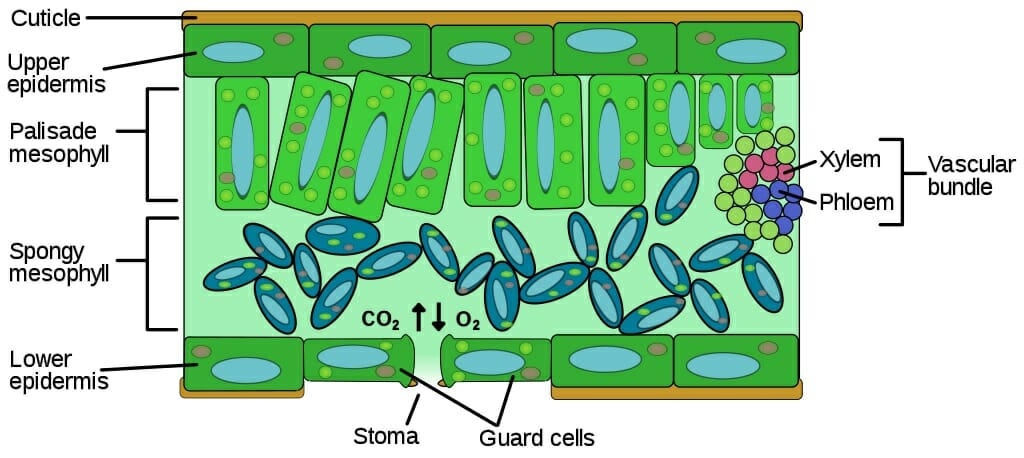Leaf Cell Definition
A leaf cell, by definition, is any cell found within a leaf. However, there are many different kinds of leaf cell, and each plays an integral role in the overall function of the leaf and the plant itself. A single leaf cell may be designed to simply photosynthesize, or create sugars from the energy in light. Other cells are designed to carry these sugars to the phloem, a specialized tube for transporting the sugars to the rest of the plant. Still other cells are specialized to carry water, which eventually form a rigid tube, the xylem. Another leaf cell is specifically designed to support the xylem and phloem into vascular bundles and transport substances to and from them. Below are several types of leaf cell, and the functions they serve. Their definitions refer to the following image.
Types of Leaf Cell
Epidermis
An epidermal leaf cell is any cell which protects the outside of the leaf. These cells are often short and flattened, much like a square pancake. They form a protective layer over the leaf. They often produce waxy substances which protect the leaf from drying out or being attacked by insects. A leaf cell in the epidermis often lacks chloroplasts, the organelles responsible for creating sugar.
The upper and lower epidermis vary slightly. The upper epidermis, often exposed to direct sunlight, is often a thin layer of translucent cells. Below this are the cells responsible for photosynthesis, so they want to be as close to the light as possible while still being protected. The lower epidermis, on the other hand, is not responsible for protecting the plant from the harmful rays of sunlight. Instead, the lower epidermis has specialized cells for allowing air exchange. These small holes, called stoma, can be opened and closed by a specialized form of leaf cell.
Guard cells, as they are called, react to various condition inside and outside of the leaf, an open and close accordingly. It is through these stoma that the plant can exchange much needed carbon dioxide for the oxygen byproduct it is producing. Another important function of the stoma is transpiration. Through this process, water is passed out of the stoma and sucked up through the roots, bringing vital nutrients to the plant.
Palisade Mesophyll
The palisade mesophyll consists of a type of leaf cell specifically designed to carry out photosynthesis. These cells are absolutely packed with chlorophyll, and simply work their hardest to pump out as much sugar as they can. This sugar they release into the intracellular space, where it works its way to the next type of leaf cell.
Spongy Mesophyll
Spongy mesophyll is exactly what it sounds like: a loose matrix of structural mesophyll cells. These cells are not neatly packed into rows like the palisade cells. Rather, they form networks around bundles of vascular cells, and transport materials to and from the bundles. Like palisade mesophyll leaf cells, they can photosynthesize, but they carry additional functions as well. These two types of leaf cell give the leaf its green color.
Vascular Bundle
The last type of leaf cell is not specific to the leaf, as it travels the entire length of the plant. The cells around the xylem and phloem together make the vascular bundle. These highly specialized cells allow water and minerals to flow up from the roots, while transporting the products of photosynthesis to the entire plant. Like the arteries and veins of a human, they allow the organism to specialize functions in different parts of the body.
References
- Lodish, H., Berk, A., Kaiser, C. A., Krieger, M., Scott, M. P., Bretscher, A., . . . Matsudaira, P. (2008). Molecular Cell Biology (6th ed.). New York: W.H. Freeman and Company.
- McMahon, M. J., Kofranek, A. M., & Rubatzky, V. E. (2011). Plant Science: Growth, Development, and Utilization of Cultivated Plants (5th ed.). Boston: Prentince Hall.
Leaf Cell

No comments:
Post a Comment